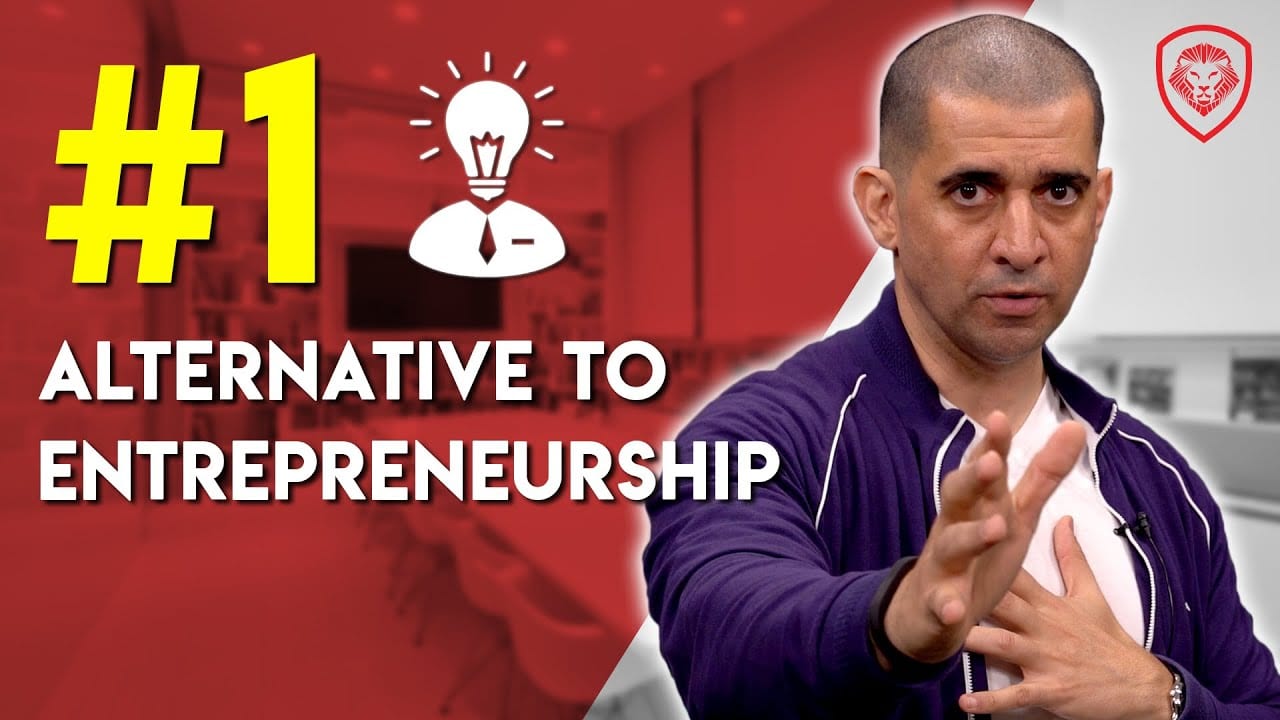Best Alternative to Entrepreneurship
So, I got a message last week on LinkedIn from an IBM executive who said, “Pat, I’ve been at IBM for a while and I have been following your content for a few years, but I don’t make very good money at IBM. I really want to be an entrepreneur. However, I got a wife and three kids and I’m kind of worried about them. What should I do?”
So, we started kind of going back and forth. So, then this week we were going over potential episodes and the topic what is the alternative to entrepreneurship came up. I said, perfect! Let’s make this episode because a lot of people ask about it. The number one alternative for entrepreneurship is Intrapreneurship. This is when you’re part of a company, but you are an entrepreneur within a company. But what is the qualities of being an entrepreneur within a company? I’m going to talk to you about the eight qualities of an Intrapreneur and the right companies that breed and attract them.
But before I get into the episode, I want to go over one thing. Yesterday, Chi from Norway asked me, “Hey Pat, what do you think has more influence, nature or nurture?”
I said, both probably have a lot of influence on your development, but one side has a greater impact than the other. I think a lot of people are forced into situations. Take this story, for instance, I’m living in Germany. My mom has no money and my dad is in Iran trying to get to us. We’re living in a refugee camp and I must figure out a way to make money because I want to buy a Super Nintendo. So, I figured out a way to make money by working at a local pool. Eventually, I make enough to buy that Super Nintendo. One person could look at that story and say that is obviously nature. But you could also approach it from the angle that there were no alternatives. If my mother had the money to buy a Super Nintendo, maybe I wouldn’t have gone to find work.
Years later I decided to join an insurance agency. I’m growing in this company and I never really had plans of being an entrepreneur. My idea was, let me figure out a way to go make my money become the CEO within a company. I thought I could carve out a piece of this company for myself and use that money to invest in other companies and grow that personal amount of money.
One day I sent a 16-page letter to the higher-ups at this company. I wanted them to consider making some adjustments. Nobody responded. Then I send it to the parent company. Within 30 minutes a guy named Jack, responds back and sets up a meeting. I told them my ideas and they tried to implement some of them, but this lady, Susan, shuts the entire thing down. Susan forced this intrapreneur to become an entrepreneur. She cornered me. I had no desire to put all my savings and become an entrepreneur. I had no desire to gets sued, work late nights, or work 100-hour work week for three, four or five years. But she forced me to do it.
Some of you may be watching this thinking, “Pat, I’m an 18-year-old kid. I’ve always wanted to be an entrepreneur because I’ve been following your content for four years. I want to be the next Ray Kroc. I want to be the next Jobs.” That’s great but let me explain my point about intrapreneurs a little deeper.
$42.3 billion is the net worth of the richest intrapreneur in the world, Steve Ballmer. Steve Ballmer worked at Microsoft, became the CEO, and through stocks and bonuses, he’s now worth 42.3 billion. He’s the richest intrapreneur in the world and he owns multiple different teams, businesses, companies, stocks, shares, all this other stuff.
Steve Jobs, who was a very famous entrepreneur, starts Apple with Wozniak. Then gets fired in 1985. He’s worth $250 million dollars because of his shares, which at the time he owned 20 percent of the company. He sells them all and keeps only one share so we can get all the updates of what’s going on with Apple. Jobs became an entrepreneur again, starts a couple of ventures. One of them, Pixar ends up being bought by Disney for $7.4 billion. He owed 138 million shares of Pixar and he made a lot of money from the sale.
Then he returns to Apple and becomes an intrapreneur. He negotiates a deal for them to give them 5.5 million shares of Apple. Those 5.5 million shares of Apple are how he made billions of dollars. By the way, he ended up being the biggest shareholders of Disney in the world because of Pixar. What’s the moral of the story? Even Jobs became an intrapreneur.
So let’s circle back to the topic, what are qualities of intrapreneurs and how do you identify a company that breeds and attracts intrapreneurs? And why is intrapreneurship the number one alternative to entrepreneurship? Here are the eight points I want you to know about intrapreneurs.
- Intrapreneurs Think like an Entrepreneur
- Intrapreneurs Work like an Entrepreneur
- Intrapreneurs are Urgent like an Entrepreneur
- Intrapreneurs Innovative
- Intrapreneurs Pushed the Envelope
- Intrapreneurs Protective of the Brand
- Intrapreneurs Speak a Different Language
- Intrapreneurs are Very Protective of Money
One-way intrapreneurs and entrepreneurs are different is that intrapreneurs are typically diplomatic with the founder and the entrepreneur of the company because they have that respect to say, look, I think like you, I work like you. I’m the same as you, but you put up the money. You took all the risk. So now having said that, you’re probably thinking, “Where can I go to find a company that breeds intrapreneurs.”
How Companies Breed and Attract Intrapreneurs
They Foster Intrapreneurs Internally
Companies that breed and attract intrapreneurs do so by communicating in a language that intrapreneurs understand and gravitate towards. A company says, “Hey, we within a company are looking for x, y, z. We will support you and grow your work ethic and style.” Intrapreneurs love that kind of an environment. Companies cast out a vision to employees that any employee can come up through the ranks without putting up their savings, without having to risk three years of sleepless nights and they can achieve their goals.
They are Comfortable with a Level of Risk and Creativity
I was negotiating with a carrier recently and the people in the room were sharing their frustration with me about the guy at the top of the company who rejects whatever they say. Since they are constantly being rejected, these employees are always playing defense. They’re not playing offense because the guy at the top is afraid of risk and creativity. That’s why they’ve been flat like this for a while. If you are an intrapreneur you want to play offense and you want your ideas to be heard. As a company, if you want to attract and breed intrapreneurs you have to be willing to take risks and think creatively because that is going to inspire your workforce of intrapreneurs.
They are not Afraid of Creating Linchpins
A linchpin holds everything in place if you removed the linchpin on anything – things come apart. Seth Godin wrote a book about linchpins. Some companies are afraid of linchpins because they don’t like people that are irreplaceable. If all of a sudden, a person in the company becomes way too powerful, some companies like, “Oh my gosh, we better fire this guy before he takes over my position or takes the company in a different direction.” No. You like that guy to stay around, you like that person that has a lot of influence. Those people lock into a relationship with clients, vendors, shareholders, etc. They can be a great service to your company because of that influence.
It almost like back in the days when Nero was one of the Emperors of Rome. Nero realizes that two people have a lot of influence over him, his mom and Seneca. So, he kills his mom and eliminates Seneca. Now he’s all by himself. Guess what happens to Nero in the end? He was so afraid of linchpins that eventually get eliminated. So, these stories about fearing linchpins are nothing new. A company that breeds and attracts intrapreneurs is not afraid of linchpins.
Their Compensation Structure is Created to Breed Intrapreneurs
Companies build their compensation structure to benefit ideas and innovation breed and attract intrapreneurs. Intrapreneurs want to see that if they work, act, and innovate, that their company is going to treat them like an entrepreneur and reward them like an entrepreneur with bonuses, stocks or whatever they have in place. Intrapreneurs can make more than just six figures because they bring in more money to the company, but the company has to reward them for their efforts if they want to keep them around.
I’ve never talked about intrapreneurship before and I know so many of you guys have been asking about it, especially at the professional community on LinkedIn. So, I hope this has provided you with some great information. Some of the younger people watching this may say, “I don’t really know if I like it. I just want to be an entrepreneur.” This is for the people in the audience that are looking for an alternative to entrepreneurship. Intrapreneurship with the right company who fosters intrapreneurs is a great alternative.
What can you do next if you want to learn more about growing within companies or growing your own company? You want to become a CEO one day, right? The one thing you got to know before you become a CEO is you must think like a CEO. Go watch the video titled Nineteen Qualities of a Great CEO. The video breaks down how a CEO’s brain is wired, so whether you’re going to be an entrepreneur or an intrapreneur, you’ve got to learn how to think like a CEO. If you wanted a pdf, send a text message to 747-260-8461. We will send a pdf of today’s episode.
For you commuters out there, a lot of people asked me, “Pat, do you guys have a podcast?” Yes, we have a podcast. Go to iTunes and you will see we have nearly 300 episodes. You can listen to it while you work out or drive. Most people don’t know about the podcast. The podcast community generally doesn’t even know about the YouTube channel. There are two different communities, but for some of you guys that are following the content on YouTube, click over here to go listen to the podcast as well. If you haven’t subbed, click on the link to subscribe to Valuetainment.
Visit the official Valuetainment Store for gear
About Valuetainment:
Founded in 2012 by Patrick Bet-David, our goal is to impact entrepreneurs around the world through value and entertainment. We are the #1 channel for entrepreneurs because of the best interviews, best how to videos, best case studies and because we defend capitalism and educate entrepreneurs.
To reach the Valuetainment team you can email: marketing@patrickbetdavid.com
Follow Patrick on social media:










